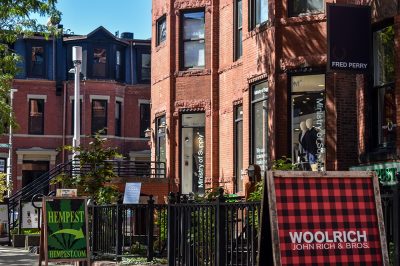From the closure of all non-essential Massachusetts businesses in March to the restrictions that came with reopening, retail stores have faced many difficulties in keeping their businesses running.

One such store, Crush Boutique, struggled to continue operations over the past few months. The women’s contemporary fashion retailer had two locations open at the start of the pandemic: one on Charles Street and the other on Newbury Street. Owners Rebecca Hall and Laura Ayers founded the shop in April of 2007, expanding to their second location five years later.
But two months into the pandemic, the Newbury boutique closed, Ayers wrote in an email.
“We were initially a bit naive when the pandemic hit and thought we would be closed for 2 weeks and then the virus would pass and business would resume as usual,” Ayers wrote. “We quickly realized that wasn’t the case.”
Crush Boutique and its sister store, Whitney and Winston, have been able to adjust to the new reality of the pandemic by going digital in addition to taking measures to offer a safer shopping experience.
“Between the online store, curbside pick up, social distanced in store business and virtual shopping appointments,” Ayers wrote, “we have managed to keep ourselves afloat.”
This in-person experience has generally damaged the retail industry, economics Ph.D. candidate Gerard Domènech Arumí said. He said the potential health risks tied to brick-and-mortar shopping means many retail stores are going out of business at this time.
“Because of the coronavirus, a lot of people are quite afraid of going to gather in places, so they’re going to go to shops less often,” Domènech Arumí said. “In addition to this, lots of these people lost their jobs, so that means that they have less money to spend,.”
Domènech Arumí added that the current economy can be defined in two words: “pretty bad.”
“A lot of restaurants and bars … had to lay off these workers, and so they are jobless from that right now,” Arumí said, “The prospects are not really good for them for a very simple reason: if your training is as a waiter or a bartender, then it is quite difficult in general to get an office job or some other white collar job.”
Local retail store Shake the Tree, located in the North End, has managed to stay open. The indie shop specializes in women’s clothing, handmade jewelry and home goods, among other products, according to its website.
Shake the Tree owner Marian Klausner said developing an online presence has kept her store afloat during the lockdown.
“We had a social media presence and had a website, but we didn’t really have an online sales portal,” Klausner said. “[The pandemic] forced me to create an online store. It forced me, and I think a lot of other businesses, to take a look at how we work, what’s important, what works, what doesn’t work and so on.”
Klausner said many retail vacancies have popped up in the areas surrounding her shop, including nearly 20 on Charles Street. She said witnessing these closures is difficult and that she empathizes with owners who have lost their livelihoods.
“My heart really does go out to anybody who’s had to close their business, because it’s their life, it’s their dream, it’s their passion,” Klausner said. “It’s what people created, and to have to close that is just a tragedy.”
However uncertain the current reality looks for retail stores, Klausner said she has high hopes for the future.
“In the future, when I look down the road, I do think you’re going to see a huge surge in young, new entrepreneurial energy,” Klausner said. “I’m optimistic in the long run that there will be another side to this.”
































































































































